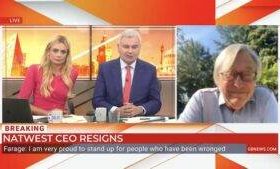LONDON — Britain announced plans to slash the number of migrants arriving by legal routes on Monday, raising the minimum salary they must earn in a skilled job by a third, amid pressure on Prime Minister Rishi Sunak to tackle record net migration figures.
High levels of legal migration have dominated Britain’s political landscape for more than a decade and were a key factor in the 2016 vote to leave the European Union (EU). Mr. Sunak has promised to gain more control after lawmakers in his Conservative Party criticized his record ahead of an election expected next year, with the opposition Labour Party far ahead in opinion polls.
But businesses and trade unions both attacked the measures as counterproductive and challenging for the private sector and state-run health service, both dogged by labor shortages.
Figures last month showed annual net migration to the United Kingdom hit a record of 745,000 in 2022 and has stayed at high levels since, with many migrants now coming from places like India, Nigeria and China instead of the EU.
Home Secretary (interior minister) James Cleverly said the new measures could reduce that number by 300,000.
“Immigration is too high. Today we‚ we’re taking radical action to bring it down,” said Mr. Sunak, who is also trying to deport migrants who arrive illegally to Rwanda.
Mr. Cleverly said the government would raise the minimum salary threshold for foreign skilled workers to 38,700 pounds ($48,900), from its current level of 26,200 pounds, though health and social workers would be exempt.
Other measures included stopping foreign health workers bringing in family members on their visas, increasing a surcharge migrants have to pay to use the health service by 66%, and raising the minimum income for family visas.
TIGHT LABOR MARKET
The measures could spark new disputes with business owners who have struggled to hire workers in recent years given Britain’s persistently tight labor market and the end of free movement from the EU since Britain’s 2020 exit from the bloc.
In October, the government’s independent migration adviser recommended abolishing the so-called shortage occupations list, one of the main routes for businesses to hire migrant workers in sectors where there are severe staff shortages.
Mr. Cleverly said the government would end the current system that lets employers pay migrants only 80% of the going rate to do jobs where there is a worker shortage, and that the list of shortage occupations would be reviewed.
“We will stop immigration undercutting the salary of British workers,” Mr. Cleverly told lawmakers. “We will create a new immigration salary list with a reduced number of occupations.”
However, some studies have shown foreign workers have little or no impact on overall wage or employment levels, and Britain’s acute shortage of candidates to fill vacancies remains a problem for many company bosses.
“These changes will further shrink the talent pool that the entire economy will be recruiting from, and only worsen the shortages hospitality businesses are facing,” said Kate Nicholls, chief executive of trade body UKHospitality.
“We urgently need to see an immigration system that is fit-for-purpose and reflects both the needs of business and the labor market. The system at the moment does none of that.”
The Bank of England said last month that businesses were finding it a bit easier to hire but persistent skills shortages remained in some sectors.
Trade unions also voiced concerns at Cleverly’s plan. Christina McAnea, the general secretary of UNISON, the main union in the health sector, saying it spelled “total disaster” for the health service.
“Migrants will now head to more welcoming countries, rather than be forced to live without their families,” she said. — Reuters







